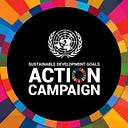UN75 Dialogue highlights the urgent need for climate action to ensure healthy lives and healthy societies
Note this is the second in a series - see the first dialogue on inclusion and solidarity and the third on economic recovery
On 3 June we continued our three-part UN75 Dialogue series exploring the future of international collaboration as we reflect on the world’s reaction to the COVID-19 global pandemic.
Ensuring Healthy Lives, Healthy Societies and a Healthy Planet
The second UN75 Dialogue in our series assembled a group of whose work focuses on the intersection of ensuring healthy societies and taking climate action.
Whether calling on leaders for to stop supporting the fossil fuel industry, emphasizing the tight interconnectedness of human intervention and climate change or highlighting sustainable production and consumption practices, all panelists agreed that climate action is an urgent need in order to ensure healthy lives around the world.
Panelists:
- Aaron Holtz | Policy Director for Gender Equality and Inclusion at Global Citizen
- Merili Vares | Executive Director and Member of the Management Board at Let’s Do It Foundation
- Ricky Kej | Grammy Award Winning Music Composer and Environmentalist
- Vanessa Nakate | Climate Activist, Founder of Rise Up Climate Movement, Founder of 1 Million Activist Stories
Guest Speakers:
- Marina Ponti | Global Director, UN SDG Action Campaign
- Natalie Samarsinghe | Chief of Strategy, United Nations 75th Anniversary
Moderator:
- Arrey Obenson | CEO and Co-Founder, Transformunity
Current State of the Planet
As climate activists and environmentalists, what was clear is that the panelists understand that the greatest issues we face in the world today are interconnected — including the COVID-19 crisis. A poll of the webinar’s attendees revealed that 85% had at least somewhat or very much redirected their personal focus on climate action recently due to COVID-19.
Echoing this threat to progress on climate action, Merili Vares, Executive Director of the Let’s Do It Foundation, pointed out that while it can be easy to redirect our actions to the current global health crisis, leaders cannot forget existing commitments for change.
Grammy Award winning music producer Ricky Kej, continued to say:
“The international community needs to prioritize the climate crisis with greater urgency…the pandemic has shown us that if people are faced with a clear and imminent danger to themselves and to their loved ones, they’re very capable strong behavioral change in a short time.”
Dialing in on the urgency of climate action, climate activist Vanessa Nakate pointed to fossil fuels as the main driver of climate change and environmental degradation, calling on leaders to take immediate and broad-reaching action:
“You cannot avoid a climate disaster, you cannot lead climate action, you cannot bring about a Green New Deal when you’re continuously investing in the fossil fuel industry.”
Collaboration is Key to Climate Action
The webinar audience was polled to see what actions they take in their daily life for climate action, and more than half of respondents do the following three things: utilize reusable products, implement practices to consume and waste less, and car share, use public transport, bike and/or fly less.
Panelists shared that the greatest threat to the environment is human intervention and disruption, so these individual practices are a contributing force, but panelists agreed that institutions need to be leading change and working together.
When considering the trends that are threatening our planet, 75% of the webinar’s audience agreed that international collaboration is essential to managing and solving these threats; notably no one responded that it was not important for countries to work together.
In line with the audience and other panelists, Kej stated that world leaders need to work together to solve global challenges, adding concern that:
“This [global health] crisis has further divided countries that were already in conflict. Countries that were already friends, have become more friendly.”
Marina Ponti, Director of the UN SDG Action Campaign emphasized this sentiment, saying:
“In a moment like now, we need to find ways to build trust with institutions.”
An Inclusive Approach to Solving Interconnected Issues
Holtz focused on the existing plan we have to take climate action: the Sustainable Development Goals. He went on to explain that the SDGs are a promise more than a plan, and the promise can only be fulfilled if we work together.
Natalie Samarsinghe, Chief of Strategy at UN75, noted that health issues have many facets — environmental, economic, political and social — and must be addressed in a coordinated way. As we reflect on how to ensure healthy lives, healthy societies and a healthy planet in the face of this global pandemic, Samarsinghe said we need concrete proposals for change over broad priorities.
Samarsinghe is hopeful that 2020 will ultimately be more than a year marked by crisis, calling on everyone to take this opportunity to ensure our response is inclusive:
“[We can] move beyond the very valid principle of leaving no one behind, to looking at how we can lift everyone up.” She shared a message of hope, stating, “If there’s one thing the past weeks and months have shown, is that huge transformations are possible.”
Watch the full recording of the dialogue and share your voice today by taking the one-minute UN75 survey. Follow @SDGaction on social media for updates and register for the third and final dialogue in this series: UN75 Dialogue — Economic Transformation: Rebuilding Better.
